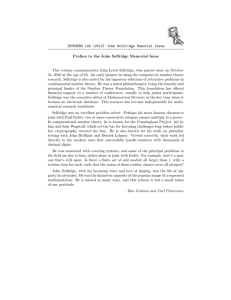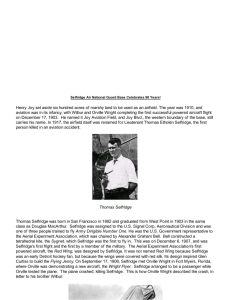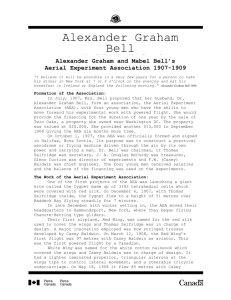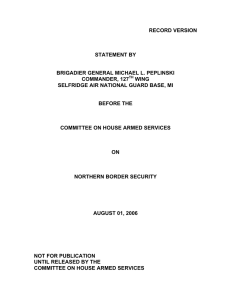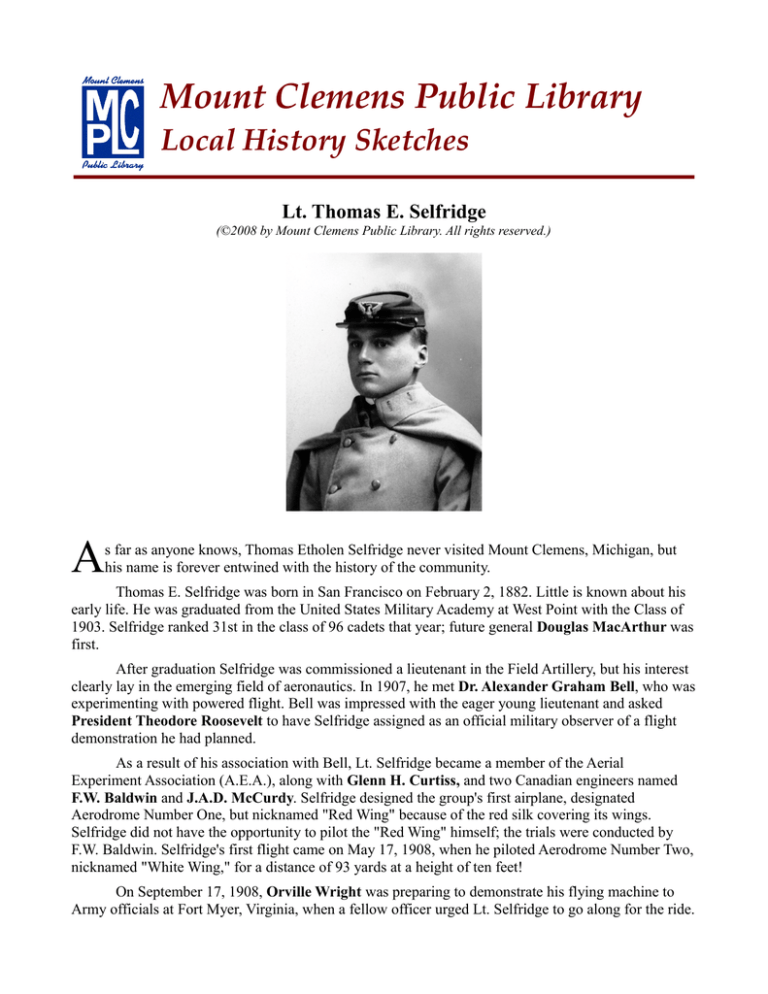
Mount Clemens Public Library
Local History Sketches
Lt. Thomas E. Selfridge
(©2008 by Mount Clemens Public Library. All rights reserved.)
A
s far as anyone knows, Thomas Etholen Selfridge never visited Mount Clemens, Michigan, but
his name is forever entwined with the history of the community.
Thomas E. Selfridge was born in San Francisco on February 2, 1882. Little is known about his
early life. He was graduated from the United States Military Academy at West Point with the Class of
1903. Selfridge ranked 31st in the class of 96 cadets that year; future general Douglas MacArthur was
first.
After graduation Selfridge was commissioned a lieutenant in the Field Artillery, but his interest
clearly lay in the emerging field of aeronautics. In 1907, he met Dr. Alexander Graham Bell, who was
experimenting with powered flight. Bell was impressed with the eager young lieutenant and asked
President Theodore Roosevelt to have Selfridge assigned as an official military observer of a flight
demonstration he had planned.
As a result of his association with Bell, Lt. Selfridge became a member of the Aerial
Experiment Association (A.E.A.), along with Glenn H. Curtiss, and two Canadian engineers named
F.W. Baldwin and J.A.D. McCurdy. Selfridge designed the group's first airplane, designated
Aerodrome Number One, but nicknamed "Red Wing" because of the red silk covering its wings.
Selfridge did not have the opportunity to pilot the "Red Wing" himself; the trials were conducted by
F.W. Baldwin. Selfridge's first flight came on May 17, 1908, when he piloted Aerodrome Number Two,
nicknamed "White Wing," for a distance of 93 yards at a height of ten feet!
On September 17, 1908, Orville Wright was preparing to demonstrate his flying machine to
Army officials at Fort Myer, Virginia, when a fellow officer urged Lt. Selfridge to go along for the ride.
Selfridge took his seat next to Wright and the pair took off. A new, elongated propeller, never before
tested, had been installed on the aircraft prior to the fateful flight. Excessive vibration caused the
propeller to strike a guy wire on the aircraft, tearing the wire from its fastening in the rudder and
breaking the propeller off about 2 feet from the end, then sending the aircraft crashing to the ground
from an altitude of about 110 feet. Lt. Selfridge fractured his skull when his head struck a strut, and he
was rendered immediately unconscious. He was attended by the Post Surgeon at Ft. Myer, but died the
same evening without ever regaining consciousness. Wright suffered a broken leg and several broken
ribs.
The plane had crashed only 50 yards from the west gate of Arlington National Cemetery, where
Selfridge was buried with full military honors a week later.
In July, 1917, after the government leased an aviation field near Mount Clemens from Henry B. Joy,
the field was named in honor of Lieutenant Selfridge, who was the first military officer to pilot an
airplane, and the first fatality of powered flight.
For more information about Lt. Thomas E. Selfridge, we recommend:
•
•
•
•
•
•
•
•
•
•
Larsen, Deborah J. and Nigro, Louis J. Selfridge Field. Charleston, S.C. : Arcadia, 2006.
"Last Flight of Selfridge Bared: 1908 Newspaper Tells Crash Story," Mount Clemens Daily
Monitor-Leader, October 5, 1953, p.1.
Musial, Robert. "He Flew, He Crashed, He Lives on at Air Base," Detroit Free Press, February
14, 1985, p.4A.
"Selfridge, Lieutenant Thomas E.," in Longyard, William H. Who's Who in Aviation History.
Novato, CA : Presidio Press, c1994, pp.171-172.
"Thomas Etholen Selfridge," in Feeny, William D. In Their Honor: True Stories of Fliers For
Whom United States Air Force Bases are Named. New York : Duell, Sloan & Pearce, c1963,
pp.24-38.
"Wright Flyer and Thomas Selfridge," [Report to the Aeronautical Board of the U.S. Army
Signal Corps on the Accident to the Wright Aeroplane at Ft. Myer, Virginia, Sept. 17, 1908].
Use this link to read the First Flight Society Shrine's biography of Thomas Selfridge
Use this link to read Selfridge's National Aviation Hall of Fame biography
Click here to read about Thomas Selfridge on Ralph Cooper's Early Aviators site.

